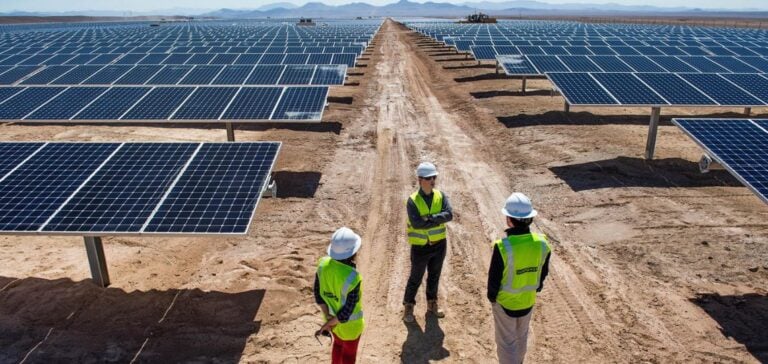Algeria accelerates its energy diversification program with a new contract for the supply of 1 GW of solar modules signed by Astronergy.
The contract supports the construction of 15 photovoltaic power plants in 12 provinces, with a total capacity of 2,000 MW.
Led by Sonelgaz, the project is part of the country’s strategy to boost renewable energy production and optimize its energy mix.
China International Water & Electric Corp.
(CWE) and Power Construction Corporation of China (POWERCHINA), two major construction companies, are responsible for building the plants, which range in size from 80 MW to 220 MW.
The 220 MW plant in Biskra is the largest of the planned facilities.
Work began with the installation of TOPCon ASTRO N5 solar modules supplied by Astronergy.
Partnerships and local development
Algeria’s choice to work with CWE and POWERCHINA reflects a strategy of relying on companies capable of managing large-scale projects.
These partnerships will enable rapid progress to be made in deploying the infrastructure required to meet the country’s growing energy needs.
Algeria’s Minister of Energy and Mines, Mohamed Arkab, points out that the construction of the Biskra power plant is expected to generate around 600 jobs, thereby contributing to the local economy.
This development comes against a backdrop of rising energy demand in North Africa, where Algeria is seeking to capitalize on its solar potential.
By attracting international players, the country aims not only to strengthen its infrastructure, but also to diversify its sources of energy supply.
Impacts on energy production and emissions reduction
The photovoltaic power plants developed as part of this project are expected to generate an estimated 400 million kilowatt-hours a year at the Biskra plant alone.
This increase in installed capacity will help reduce dependence on fossil fuels and improve national energy security.
The efficiency of the new solar modules also helps to optimize energy yields, thus meeting the needs of infrastructure reliability and durability.
The use of Astronergy’s TOPCon type n modules, renowned for their performance in a wide range of climatic environments, illustrates the company’s focus on technological efficiency.
These technological solutions are strategic for meeting energy production targets while minimizing long-term operating costs.
Positioning in the African market and growth prospects
Astronergy’s involvement in Algeria is part of a broader strategy to penetrate the African solar energy market.
The company is already active in large-scale projects such as the Noor Ouarzazate solar power plant in Morocco and the Benban solar power plant in Egypt.
Its ability to deliver complex projects in partnership with local and international players strengthens its position in this growing market.
Algeria, with its favorable climatic conditions and need for new production capacity, represents an attractive market for companies specializing in energy solutions.
The country’s energy infrastructure is undergoing radical change, and these photovoltaic projects pave the way for other similar initiatives in the region.






















